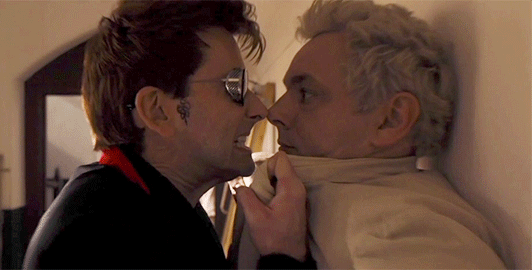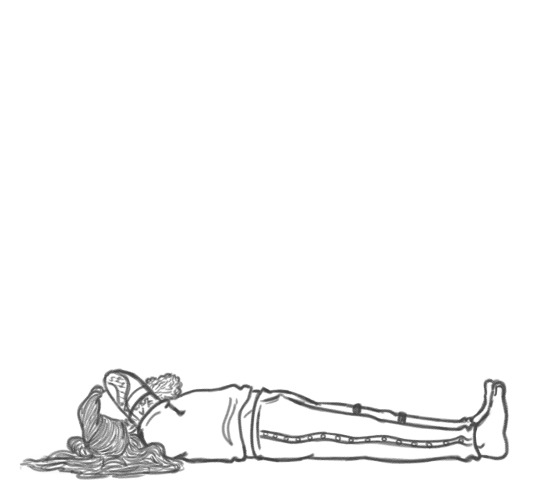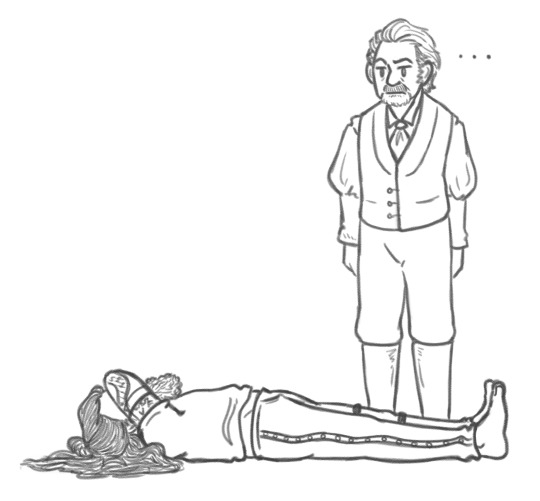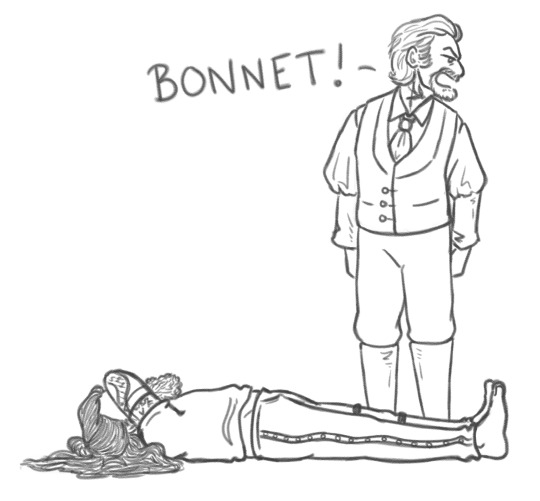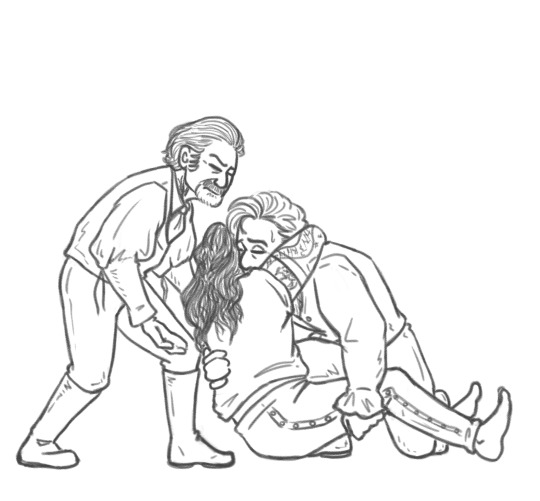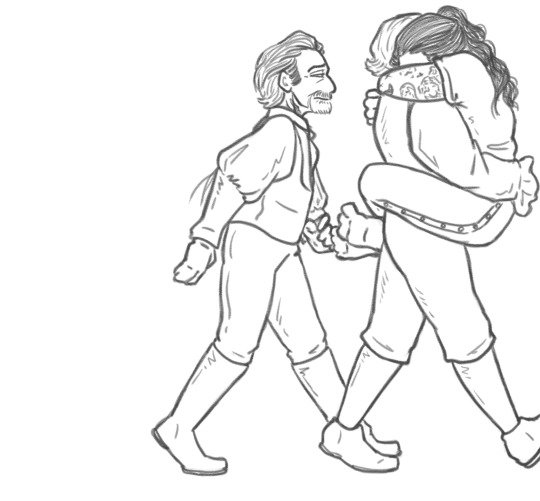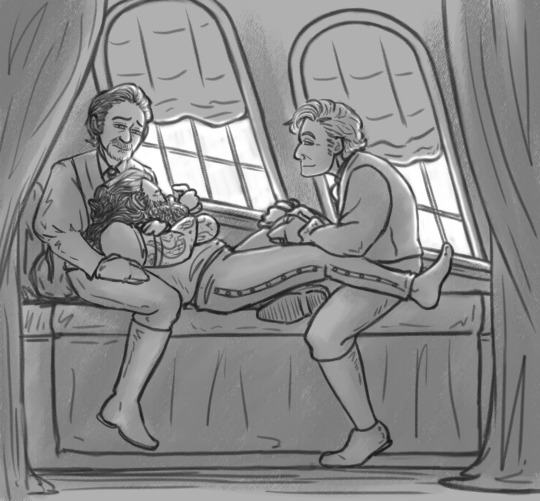autism go brrrrthey/he - 18edward teach and anthony j crowley enjoyer
Don't wanna be here? Send us removal request.
Text
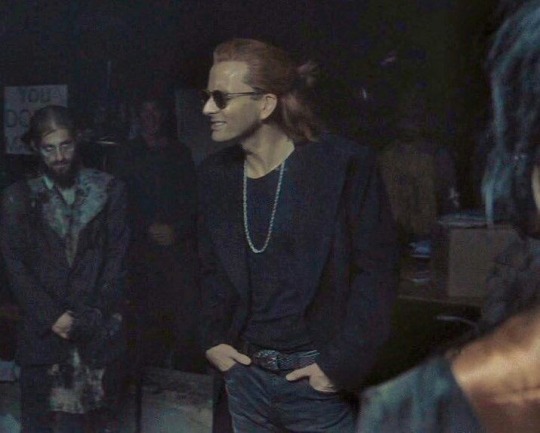
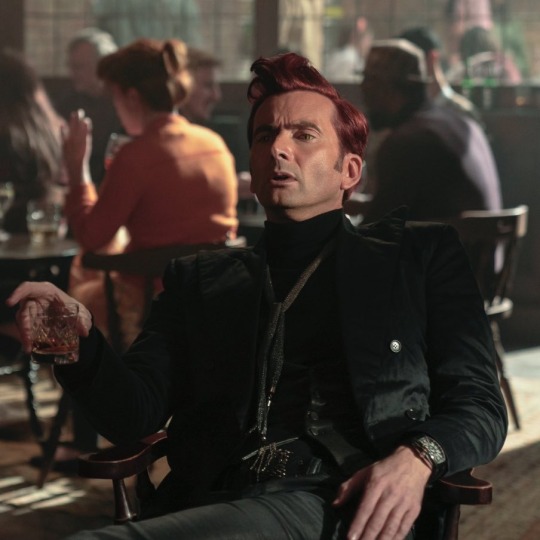
personally i just think crowley needs to have both his manbun and turtleneck back and aziraphale won’t be able to resist staying
#these are my favourite crowley looks of all time#i need him so bad#crowley#anthony j crowley#aziraphale#good omens#david tennant#ineffable husbands#good omens s2#gomens
54 notes
·
View notes
Text
Alright, not to be too predictable, but I wanna talk about space and color as it's used in the intro to episode 1 for a minute. And you know, show some gorgeous space shots.
So we open in the dark. There's distant lights and the occasional flare from them moving through space but for the most part we get the angel that would eventually become Crowley alone in enough darkness that he himself isn't even giving off particularly significant amounts of light.

But then, enter Aziraphale. He arrives in a big ball of blue light shining above him that really emphasizes Crowley's red hair. They get tied to the colors we most often see them attached to, especially in promotional materials.

From here the entire scene gets slightly brighter, even once Aziraphale's light dims down. They're both lit up once they're together, even it the middle of literal nothingness.
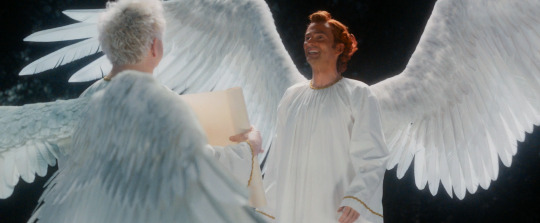
They start the universe next, using Crowley's hand crank, which gives off a magic that's a combination of their two colors - purple.
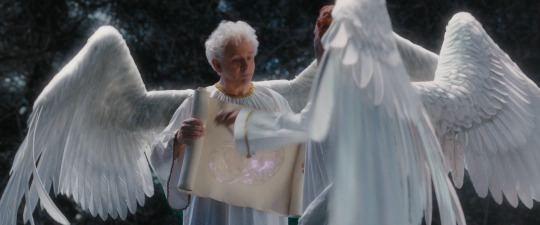
A very similar color to this shows up in heaven as a signal flare for their accidentally too powerful half a miracle. It's a color tied to a miracle so big it could've revived someone 25 times and also a miracle that got the engine of the universe running.
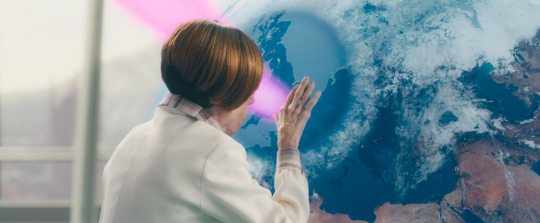
And then. Creation starts. Our first image is a very Heavenly aesthetic. It's a blueish light cutting through the clouds much like Az just cut through the dark.
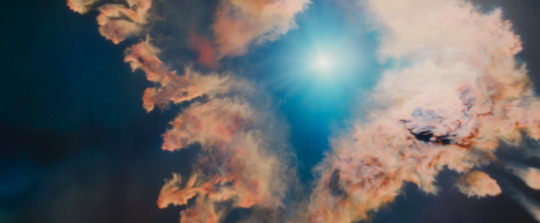
And what explodes from that is the thing that set me down this little rabbit hole in the first place: it's purple scattered through with red and blue lights.
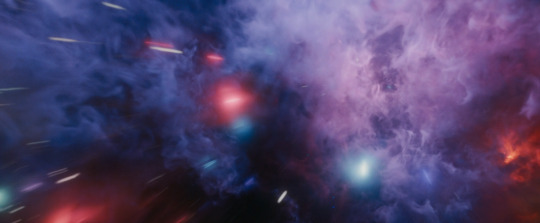
As the initial burst fades, the blue and the red separate, the color fading except for this tiny blue dot and this growing red zone on the right.
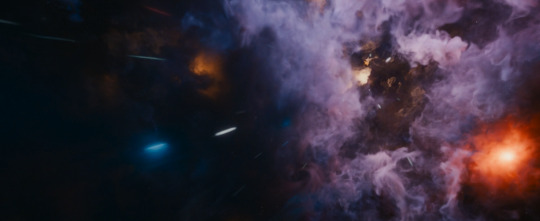
The blue then fades, leaving us with an extremely Crowley coded palette here and a very orangeish red. There's shades of gray, a little bit of light, but not nearly as much color. As the sequence moves the darkness grows but does start slowly filling with small points of light.

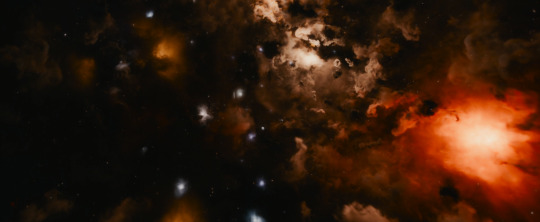
We then end up with shades of gray both light and dark. There's balance here, even if it's not particularly colorful.

And then all at once a pinkish red bursts forth with these intense clawing tendrils. At the core of it, from the heart of it, is a bright blue ball of light.

It fades into a blue heart surrounded by darkness with whisps of white resembling a certain someone's hair. Or, as some friends pointed out two people embracing.

As the nebula settles a few other colors set in but the primary scheme is still red and blue. An almost violent plume of red emerges on the left side of the image.
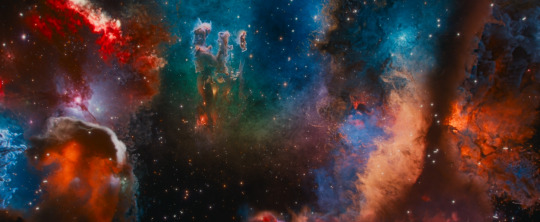
And from this moment on most shots of the two of them back them with their respective color schemes.

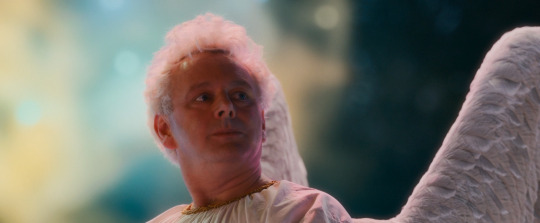

They chat and Aziraphale gets anxious. He looks for a distraction and is immediately drawn to the space where the colors mix.
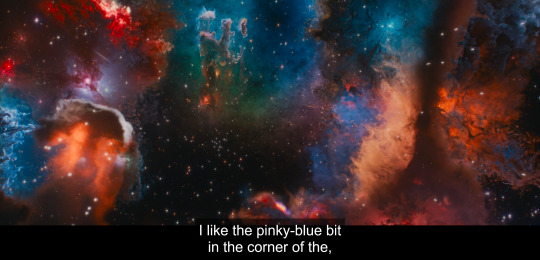
And as we fade out the other colors in the picture fade. We get the most balanced blue and red get. And on the far corners fairly clear dark and light.
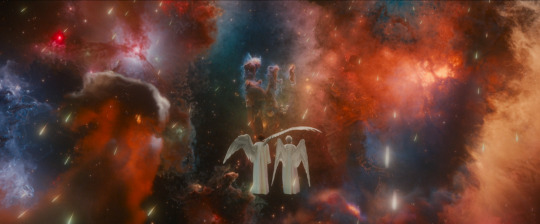
So what does this mean? The purple speaks to them being very powerful together. And, the rest is arguably just representative of the plot. We have Aziraphale as a beacon in the dark - a signal flare we know Crowley has throughout history been aware of and drawn to. We have them brightening each other. We have Az's color breaking out of heaven to mix with Crowley's to create something new and wonderful and powerful. Aziraphale's color fades, leaving Crowley alone. We then get a burst of a red closer to Crowley's current hair, with Aziraphale's blue in the core of it that eventually becomes a blue heart surrounded by darkness. That too fades, replaced by the pillars becoming their familiar hand shape and slightly more colors seeping in. As they talk together and move closer together their own colors settle back in and come to balance.
3K notes
·
View notes
Text
Obsessed with this scene and will be forever; A very long meta.
Your ‘exactly’ and my ‘exactly’ are different ‘exactly’s’
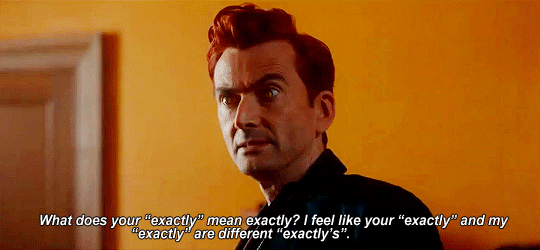
The Scene.
Crowley’s exactly means “We need to be safe and together and away from danger. Let me keep you safe.”
Aziraphale’s exactly means “We need to help because it’s the right thing to do, and we fix things when we’re together.”
Note though, that this is the only time they clarify with each other, and they don’t actually say what they mean, they say what they want to do.
“Let’s drop him off and leave him.” Vs. “Let’s take him in and help him.”
The dissection of this also poses the question, Why does Aziraphale think helping Gabriel is the right thing to do?
And the answer is; Crowley gives him the courage to do what Aziraphale thinks is the right thing and not what heaven decrees is good.
And we can come to this conclusion because Aziraphale for the first time ever, immediately and without hesitation, goes against heaven’s will, without having to be convinced or going through a cycle of indecision or guilt. This is… A. Big. Deal.
Season One.
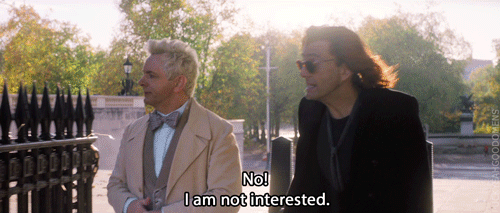
Heaven’s good requires Armageddon to be complete, and under-way. And what does Aziraphale first say about it? ���It’s all going to be rather lovely.” “I am not interested[in stopping Armageddon with you].”
Aziraphale loves the earth in this scene. He loves the people on it. He loves all the creatures great and small. He loves Crowley, too. And he still refuses. He needs Crowley to convince him, and even then he still thinks heaven will see sense once he fixes everything. He still believes that right, and good, and holy are the same thing. Even if sometimes he doesn’t agree with it.
Now, let’s go through some history. Between the two of them, for sure, but mainly Aziraphale’s.
An act of defiance; The giving away of a flaming sword. The guilt and worry Aziraphale feels after giving Adam and Eve a chance at survival is not something he gets over quickly. He worries that it was the wrong thing even though it felt right. And the problem isn’t the system that would make doing a good deed the wrong thing, the problem is him. The problem is Aziraphale.
Compliance; The flood. The crucifixion. “God’s a bit tetchy” he says before Mesopotamia is decimated. Aziraphale is clearly uncomfortable with the will of heaven here, but he does not disobey. He does what he is told because the will of God is good and right and correct. He does this same thing with the same reasoning during the Crucifixion of Jesus in 33 AD. Crowley gives us context with a few lines, “Your lot put him up there.” “I showed him all the Kingdoms of the world.” We see a demon who still doesn’t understand why good is so cruel, and knowledge is so evil. And we see an angel that refuses to be conflicted despite his own inherent morality. Because Aziraphale understands why Crowley has questions, he has them too by now. However, Aziraphale has something Crowley didn’t; he has the knowledge of what good intentions and well-meaning questions get an angel.
Doing bad in order to do good. Let’s talk about the Job mini-sode, because let’s be completely real; I’ll never be done talking about the Job mini-sode.

Aziraphale starts this episode thwarting evil. Something he is not conflicted about. You have to thwart evil when you’re good. That’s the whole dance at this point. Crowley stops the dance though, he presents a permit. A permit from a higher authority. Meaning that Crowley, the demon, is performing the will of not only Hell, but also of Heaven. A theme that IS THE WHOLE POINT OF SEASON 1. For all their want of a war, heaven and hell want the exact same thing.
Crowley even states, “The real ‘Big One’ will be between ‘all of them’ and ‘all of us’”. At the end of Season 1 Episode 6.
Aziraphale is horrified by this “permit”. And he goes to check on the validity in heaven, and well. He finds out that it’s real. He doesn’t go higher after that, because he knows you don’t question. He knows he can’t ask why? So he goes to Crowley. If Crowley doesn’t do the evil thing, then Aziraphale doesn’t have to break the rules to thwart it. And well, even though Crowley is a demon, Aziraphale doesn’t actually see him do demonic things all that much. Aziraphale still thinks that Crowley acts like an angel. He’s even starting to think that Crowley is on the side of good. Good being heaven. Crowley denies this, but Aziraphale doesn’t listen. Crowley says, “Kill the blameless Children of Blameless Job” and Aziraphale isn’t going to stop him. The demon has a permit after all. But then something miraculous happens.
A crow, bleats.
Aziraphale looks at a demon defying heaven, defying hell, and doing good. He doesn’t know it yet, but this is his first glimpse of their side. At this point, Aziraphale still thinks Crowley is a little bit on heavens side, because the demon is a little bit good. But then Crowley keeps saving the Children. Crowley stands before angels and he lies to save the children. He does something bad to do something good. And then.
So does Aziraphale.
An angel lies to save children. And then that angel thinks that decision is his undoing. He readies himself for a fall that never comes. Because Crowley is going to keep his secret. This is where Aziraphale once again starts acting with his own moral code. It’s important to remember something important though. Aziraphale still thinks he’s the one who’s wrong. Not heaven. The birth of “their side” coincides with the saving of Job’s children. But there’s a problem.
It doesn’t mean the same thing to each of them. To Crowley it means and end to his loneliness. To Aziraphale it means the beginning of his millennia long struggle of reckoning good with right. Their “exactly’s” don’t match, and they don’t clarify with one another.
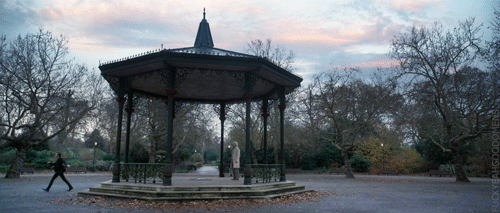
The Book and the Bandstand; Aziraphale doesn’t tell Crowley. He doesn’t say, “Let’s go save the world, I found the anti-christ” He says, “Why would I know his shoe-size?” And Crowley doesn’t suspect a thing. Ouch. They disagree on how to continue. Crowley wants to cut their losses and run away. He wants to do this because thinks they’ve already lost. And Aziraphale doesn’t give him a reason to hold on because despite everything, Aziraphale wants to be good in the heavenly way. He wants to give heaven a chance to do good too. A higher authority will surely agree with him. And now, he has the courage to ask. Only after he is turned down by heaven does he make his own decision. He steps into ‘their side’ safely, because Crowley had built it that way.
And he saves the world. With Crowley, and the Anti-Christ, and a series of human beings.
Aziraphale retreats to the safety that Crowley has built for them and that he himself has built as well, despite constantly looking over this shoulder. And he finds comfort there. It is the entire reason he finds himself comfortable making his own choices in Season 2, regarding what is good. It’s why he helps Gabriel, and it’s how he gets Crowley to do it too.
You might even say that Aziraphale embraces ‘their side’ more than ever in Season 2. He includes Crowley in all of his plans, excitedly tells him information he finds, calls the bookshop, the Bentley, and their existence, ours.
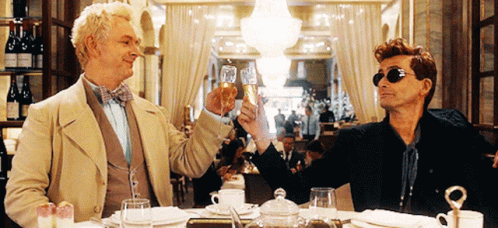
Exactly vs Exactly; AND STILL THE ENDING MAKES SENSE. I have a whole meta HERE about the reason Aziraphale made the decision he did, but I want to talk about it a little bit more. Because it’s the same problem. Their “exactly’s” are different, and neither of them asks the other to explain why.
In this particular case of the ending scene of Season 2, in place of the phrase “exactly” they use the word “together”.
Aziraphale wants Crowley with him in heaven, because they fix things when they’re together. And Aziraphale has faith they they can fix heaven. “We can be together” is how he presents it to Crowley. Crowley rightly sees this as naive, and he’s upset that Aziraphale thinks he wants to be something he’s not anymore. He finds it hurtful that Aziraphale wants him to change.
“We can go off together” Is what Crowley counters. He says all of this awful, please let us go off somewhere the danger isn’t. Let me keep you safe. Aziraphale doesn’t want to run away. He wants to save the world again. He wants to save it with Crowley. He wants them both to be good, too.
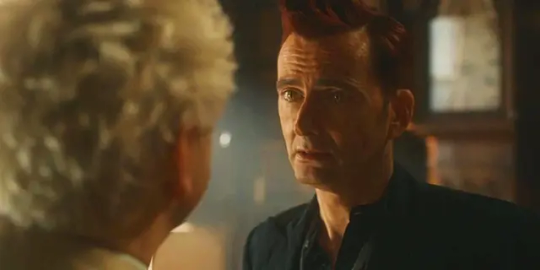
IT’S THE SAME ARGUMENT.
Only Crowley doesn’t let Aziraphale win this time. Aziraphale isn’t right this time. And Crowley isn’t wrong. (I mean I don't think he's right either, they need to find a compromise that isn't the toxicity of heaven and isn't the loneliness of running away.) This time he says, “It’s finally too much, you’re finally asking me to do too much.” Crowley for the first time when asked to make the decision between the two of them, chooses himself. Neither of them explain themselves, and neither of them asks the other to do it either. Because asking questions has always been dangerous for both of them. Anyway, this season makes my brain buzz and I love the ending so much.
562 notes
·
View notes
Text

i am in fact feeling so normal about them
#i am not#these gay bitches are my entire mental state#i love them sm#they’re so in love#anthony j crowley#crowley#aziracrow#aziraphale#ineffable husbands#good omens
101 notes
·
View notes
Text

This scene was absolutely beautiful BUT it’s also the crux of the issue. You guys this is where the problems start. Because—because Crowley’s already cast out, he finds COMFORT in the idea that they are lonely together. “As far as he can” becoming “as far as they can” is an END to his complete “otherness” and something to appreciate, to covet, and to find solace in. He’s finally not alone.
But—and this is important.
Aziraphale does NOT feel that. He can’t.
This moment is completely and utterly devastating for Zira. He finds out he’s not damned and sure, he’s relieved. But he’s no longer “an Angel” in the way that he’s learned is right. He’s now unchangeably and forever; less holy—a concept that is dearly important to his identity. “[Going] along with heaven as far as he can” is a FAILING on his part. Not heaven’s(at least to him). There is no solace or comfort—he finds existence like that—just the two of them—achingly LONELY. And that’s just how his perspective demands to be taken. It’s the only perspective he is capable of in that moment AND after it, too.
Take into account Crowley has went from having no one AT ALL to having SOMEONE. And he puts EVERYTHING he has into it. This is not good. It’s unfair to Aziraphale. And it’s unfair to himself. On the opposite side, you have Aziraphale. Who has just went from having the ENTIRE HEAVENLY HOST, to having this SINGLE demon— who, one minute ago, Aziraphale thought would be dragging him off to hell.
And the part that aches is that this perspective hasn’t changed. Aziraphale feels like his existence is lacking because he wants so badly to be GOOD. And good is Holy. Good is heavenly. He’s the problem for having morals that are misaligned.
Spoilers for the last episode:
Aziraphale has just been given the validation that he is not only GOOD but the most HEAVENLY Angel there is, the Supreme Archangel, even. And if heavens morals are now HIS morals, then that’s EVERY PROBLEM SOLVED. With a bow even, because Crowley’s basically on heavens side anyway, he’s GOOD, isn’t he? He’s been good this whole time, so why wouldn’t heaven want him back? Reinstating him as Angel would fix everything. They can be together, and they can be good, and they can be HOLY. All Aziraphale’s conflicting emotions about loving Crowley can be packed away because Crowley will be perfect again—and surely Crowley wants to be perfect—wants to be forgiven.(sorry everyone, that hurt me too, oof) Aziraphale is SHOCKED by Crowley’s refusal. He’s devastated that his version of perfect is treated as something naive and distasteful.
Crowley’s devastated too. He’s just lost “their side”. A concept that for 5000+ years has been THE ONLY THING he puts love into besides his car and perhaps his plants(And humanity, but he’ll never admit to that—I’m looking at the “No more dying” scene). Crowley is constantly being devastated by Aziraphale. He’s “too fast”, he’s too evil, he’s too good sometimes. Crowley has always been TOO MUCH. But this is different because for four years, he’s had “them”(on their own side) without the hiding, and without the denial and without Aziraphale constantly putting former jobs between them. PLUS he has a mountain of trauma centered around the concept of “forgiveness”, so that’s not great considering Aziraphale’s last words to him(THAT HE HASNT SAID ALL SEASON EVEN WHEN HE MADE CROWLEY APOLOGIZE IN THE FIRST EPISODE, AHHHHH). He’s losing everything and he’s desperate: Why isn’t he enough, hasn’t he been enough these last 4 years? Hasn’t HE been enough the last 6000?
Aziraphale has always been enough for Crowley. But being enough for Crowley doesn’t fix how Aziraphale has never been enough for himself, not since Job. He looks at this offer as a chance for HIM to be enough, and for Crowley to be FORGIVEN. Crowley looks at it as a betrayal because it’s Aziraphale saying Crowley ISNT enough, and he NEVER has been.
But that’s not what Aziraphale is saying. He’s saying, “Let me fix it for you”. Crowley is hearing, “Let me fix you for it.” Two completely different and completely horrifying concepts.
And then Crowley needs to say HIS piece(oh my gosh, btw, this was heartbreaking).
“Let’s be together on our terms” is basically what I’ve distilled it down to. But Aziraphale hears, “Let’s run away from our problems”
Aziraphale doesn’t want to run away, and Crowley doesn’t want to change who he is.
They both want to be together so badly but they don’t understand why they each want it so differently. And Aziraphale can’t compromise because he’s brainwashed and LOATHES himself. And Crowley can’t compromise because he’s traumatized and LOVES Aziraphale just as he is. Crowley doesn’t want to be good on heavens terms. He can see Heaven for what it is; “toxic”. He hates heaven not only for what the Host did to him, but for HOW THEY TREATED Aziraphale.
They both don’t understand each other because for all the pleading and presenting and monologuing, they never once in that whole conversation, actually talked.
#why can’t these bitches just communicate and be happy#good omens 2#good omens spoilers#go2 spoilers#good omens meta
7K notes
·
View notes
Text
Aziraphale’s Choice, the Job Connection, and Michael Sheen’s Morality
I’ve had time to process Aziraphale’s choice at the end of Season 2. And I think only blaming the religious trauma misses something important in Aziraphale’s character. I think what happened was also Aziraphale’s own conscious choice––as a growth from his trauma, in fact. Hear me out.
Since November 2022 I’ve been haunted by something Michael Sheen said at the MCM London Comic Con. At the Q&A, someone asked him about which fantasy creature he enjoyed playing most and Michael (bless him, truly) veered on a tangent about angels and goodness and how, specifically,
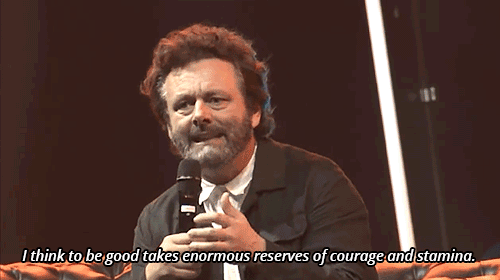
We as a society tend to sort of undervalue goodness. It’s sort of seen as sort of somehow weak and a bit nimby and “oh it’s nice.” And I think to be good takes enormous reserves of courage and stamina. I mean, you have to look the dark in the face to be truly good and to be truly of the light…. The idea that goodness is somehow lesser and less interesting and not as kind of muscular and as passionate and as fierce as evil somehow and darkness, I think is nonsense. The idea of being able to portray an angel, a being of love. I love seeing the things people have put online about angels being ferocious creatures, and I love that. I think that’s a really good representation of what goodness can be, what it should be, I suppose.
I was looking forward to BAMF!Aziraphale all season long, and I think that’s what we got in the end. Remember Neil said that the Job minisode was important for Aziraphale’s story. Remember how Aziraphale sat on that rock and reconciled to himself that he MUST go to Hell, because he lied and thwarted the will of God. He believed that––truly, honestly, with the faith of a child, but the bravery of a soldier.
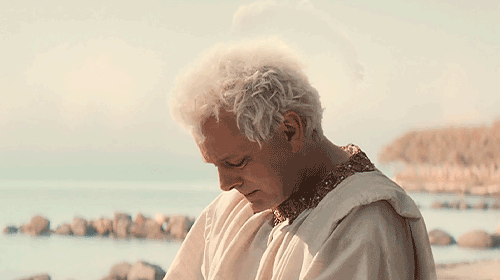
Aziraphale, a being of love with more goodness than all of Heaven combined, believed he needed to walk through the Gates of Hell because it was the Right Thing to do. (Like Job, he didn’t understand his sin but believed he needed to sacrifice his happiness to do the Right Thing.)
That’s why we saw Aziraphale as a soldier this season: the bookshop battle, the halo. But yes, the ending as well.
Because Aziraphale never wanted to go to Heaven, and he never wanted to go there without Crowley.
But it was Crowley who taught him that he could, even SHOULD, act when his moral heart told him something was wrong. While Crowley was willing to run away and let the world burn, it was Aziraphale (in that bandstand at the end of the world) who stood his ground and said No. We can make a difference. We can save everyone.

And Aziraphale knew he could not give up the ace up his sleeve (his position as an angel) to talk to God and make them see the truth in his heart.
I was messed up by Ineffable Bureaucracy (Boxfly) getting their happy ending when our Ineffable Husbands didn’t, but I see now that them running away served to prove something to Aziraphale. (And I am fully convinced that Gabriel and Beelzebub saw the example of the Ineffables at the Not-pocalypse and took inspiration from them for choosing to ditch their respective sides)
But my point is that Aziraphale saw them, and in some ways, they looked like him and Crowley. And he saw how Gabriel, the biggest bully in Heaven, was also like him in a way (a being capable of love) and also just a child when he wasn’t influenced by the poison of Heaven. Muriel, too, wasn’t a bad person. The Metatron also seemed to have grown more flexible with his morality (from Aziraphale's perspective). Like Earth, Heaven was shades of (light?) gray.
Aziraphale is too good an angel not to believe in hope. Or forgiveness (something he’s very good at it).
Aziraphale has been scarred by Heaven all his life. But with the cracks in Heaven’s armor (cracks he and Crowley helped create), Aziraphale is seeing something else. A chance to change them. They did terrible things to him, but he is better than them, and because of Crowley, he feels ready to face them.
(Will it work? Can Heaven change, institutionally? Probably not, but I can't blame Aziraphale for trying.)
At the cafe, the Metatron said something big was coming in the Great Plan. Aziraphale knows how trapped he had felt when he didn’t have God’s ear the first time something huge happened in the Big Plan. He can’t take a chance again to risk the world by not having a foot in the door of Heaven. That’s why we saw individual human deaths (or the threat of death) so much more this season: Elspeth, Wee Morag, Job’s children, the 1940s magician. Aziraphale almost killed a child when he couldn’t get through to God, and he’s not going through that again.
“We could make a difference.” We could save everyone.

Remember what Michael Sheen said about courage and doing good––and having to “look the dark in the face to be truly good.” That’s what happened when Aziraphale was willing to go to Hell for his actions. That’s what happened when he decided he had to go to Heaven, where he had been abused and belittled and made to feel small. He decided to willingly go into the Lion’s Den, to face his abusers and his anxiety, to make them better so that they would not try to destroy the world again.
Him, just one angel. He needed Crowley to be there with him, to help him be brave, to ask the questions that Heaven needed to hear, to tell them God was wrong. Crowley is the inspiration that drives Aziraphale’s change, Crowley is the engine that fuels Aziraphale’s courage.
But then Crowley tells him that going to Heaven is stupid. That they don’t need Heaven. And he’s right. Aziraphale knows he’s right.
Aziraphale doesn’t need Heaven; Heaven needs him. They just don’t know how much they need him, or how much humanity needs him there, too. (If everyone who ran for office was corrupt, how can the system change?)
Terry Pratchett (in the Discworld book, Small Gods) is scathing of God, organized religion, and the corrupt people religion empowers, but he is sympathetic to the individual who has real, pure faith and a good heart. In fact, the everyman protagonist of Small Gods is a better person than the god he serves, and in the end, he ends up changing the church to be better, more open-minded, and more humanist than god could ever do alone.
Aziraphale is willing to go to the darkest places to do the Right Thing, and Heaven is no exception. When Crowley says that Heaven is toxic, that’s exactly why Aziraphale knows he needs to go there. “You’re exactly is different from my exactly.”
____
In the aftermath of Trump's election in the US, Brexit happened in 2018. Michael Sheen felt compelled to figure out what was going on in his country after this shock. But he was living in Los Angeles with Sarah Silverman at the time, and she also wanted to become more politically active in the US.
Sheen: “I felt a responsibility to do something, but it [meant] coming back [to Britain] – which was difficult for us, because we were very important to each other. But we both acknowledge that each of us had to do what we needed to do.” In the end, they split up and Michael moved back to the UK.
Sometimes doing the Right Thing means sacrificing your own happiness. Sometimes it means going to Hell. Sometimes it means going to Heaven. Sometimes it means losing a relationship.
And that’s why what happened in the end was so difficult for Aziraphale. Because he loves Crowley desperately. He wants to be together. He wanted that kiss for thousands of years. He knows that taking command of Heaven means they would never again have to bow to the demands of a God they couldn’t understand, or run from a Hell who still came after them. They could change the rules of the game.
And he’s still going to do that. But it hurts him that he has to do that alone.
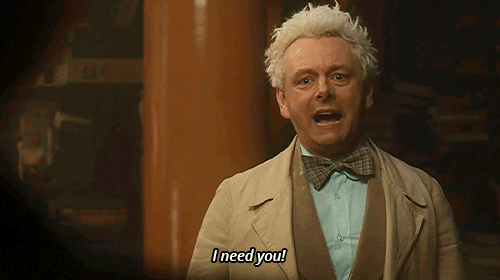
11K notes
·
View notes
Text
‘He’s too pure of heart to be anyone’s bit on the side’
Is that why you’ve never made a pass, Crowley? Is that why you’re living in the car? Never tried to kiss him? Never initiated touch (it’s usually Aziraphale touching Crowley)? Never tried to ask for more? Never tried for the fabulous kiss?
Have you never turned around and seen the way he gazes at you, Crowley? Never seen the look of pure adoration or for that matter the looks of pure lust? Did you always think Aziraphale was too pure of heart for the love you wanted to offer him?
And then Nina says something and Aziraphale drags you into the dance and you think well perhaps, no less pure of heart but perhaps Aziraphale could want you, could want what you want.
But by the time you tried, Heaven had already stolen him.
8K notes
·
View notes
Text

In season three, I’m gonna need their first meeting’s ‘gorgeous’ line to happen again, except this time it’s *actually* aimed at Aziraphale.
15K notes
·
View notes
Text
thinking about the fact that crowley was literally at his most vulnerable at the end of ep6 as we watch him tear up and get so desperate, with the kiss being a last act of desperation to get aziraphale to stay because deep down he knows he’s fighting a losing battle after hearing what azira had to say about going back to heaven 🙁
he is literally gripping onto azira in that kiss, almost as a plea - you can see his grip slightly tighten at one point and see him subtly but visibly shaking 🙁🙁
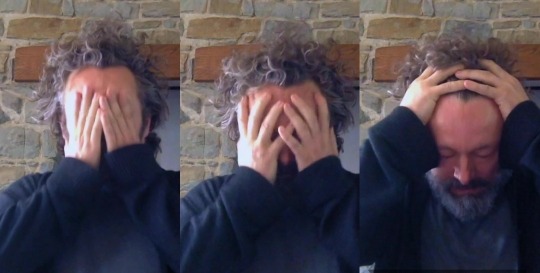
#ineffable husbands#aziraphale#crowley#good omens#good omens spoilers#crowley x aziraphale#anthony j crowley#good omens 2#david tennant#michael sheen#i just want them to be okay#crowley deserves better#aziraphale better do the apology dance for eternity
15 notes
·
View notes
Text
AJ Crowley vs Forgiveness

I need to talk about Crowley for a minute so buckle up or move on.
"It’s not so bad once you get used to it” from Season 1 Episode 1 and an early chapter of the book is something of a throwaway joke. But being damned isn't much of a joke to Crowley, even if he makes jokes to cover it up.
The first thing to understand is that damnation doesn’t end after Crowley either saunters vaguely downwards or is dropped into a burning pile of sulfur(conflicting accounts from the demon himself). Being damned is a continuous state of being AND something that could very well happen to him again.
He was too ambitious for heaven—too curious. Something that he now knows is distinctly not a heavenly virtue. It’s just that those traits are also not virtues in hell either. And on top of that—he’s good.
Which in his particular role, is an extremely dangerous thing to be. So he isn’t good, and he isn’t nice and he doesn’t feel trite things like empathy or love. Except that he knows intrinsically that all of that is utter bullshit. And if anyone who isn’t Aziraphale realizes this, he doesn’t really know what falling from hell would be like, but he doesn't want to be the first.
Another thing to remember is that Crowley doesn’t understand why he was cast out. He understands that it was the questions, that it was his ambition to try and suggest improvements, but he can’t understand why. And the shame of that being yet another question is not lost on him.
The resentment there that has festered for millennia is understandable and expected and HES RIGHT TO FEEL IT. And it’s the reason why he has such a negative reaction to the concept of “forgiveness” but has a relatively amicable relationship with apologies. And I know this is going to sound crazy after nearly 400 words, but this is the actual concept I want to dissect.
Because Aziraphale’s “I forgive you”s of the past have never gotten a good response, but they’ve also never gotten a “don’t bother”. Aziraphale uses that phrase specifically against Crowley when he needs to put distance between them. When he knows that Crowley is right. And Crowley knows that Aziraphale uses that phrase for exactly that purpose because they have being playing their parts for thousands of years. And he’s always been willing to wait in the past. The dance begins with Crowley challenging Aziraphale with something tempting.
The Great plan is dumb. What if we just left together? You’re being dumb. (I need to link that one Tumblr post that inspired this, just look at this.) Here.
And finally, desperately, This is what you’re giving up. Because Crowley doesn’t actually think it will work. He may hope it does. But he has played his part for long enough to know exactly what Aziraphale’s next line will be. And it still devastates him. And well, it’s his decision to be done waiting for Aziraphale to catch up. Being “too fast” has been his insecurity for too long, and he’s done slowing down just so Aziraphale can try and forgive him. He still doesn’t know why what he is, is wrong.
(He isn’t)(I mean he certainly makes some unhealthy choices, and he isn’t exactly completely in the right, but he’s NOT wrong.)(Running away together ISNT the right move, but it is the more romantic one so take that as you will.)
The part that makes my brain buzz is that this aversion to forgiveness does not apply to apologies. Specifically it does not apply to the phrase “I was wrong” or "you were right" or the little dance.
This. Is. Interesting.
He doesn’t have a problem with apologizing, and he doesn’t have a problem accepting apologies from Aziraphale if that wonderful scene is to be taken at face value. The fact that the 1941 apology dance wasn’t shown is actually a crime, and you can’t convince me otherwise. And I think this is specifically because he’s not actually averse to forgiveness on the whole. It’s the idea that he needs forgiveness for simply being who he is that actually bothers him. And well. I guess he was tired of Aziraphale pretending that the concept had merit, too.
For four years he's had the freedom to be exactly who he is without the fear of damnation even if he still has the baggage that went along with the first time it happened to him. And even though Aziraphale doesn't realize it, he's asking Crowley to do something impossible for him. He's asking Crowley to admit that he needs forgiveness, and come back to heaven.
Aziraphale assumes that Crowley would not only want that, but that being with Aziraphale would make it even better. But what the angel has actually done, is give Crowley's deepest insecurity wings. And given him a reason to step away from their millennia long dance.
Because Crowley has finally, finally, finally, found something that he can't give up for Aziraphale. It's extremely poetic that that thing happens to be himself.
And okay now I’m done. I’m gonna go scream into a void.
239 notes
·
View notes
Photo
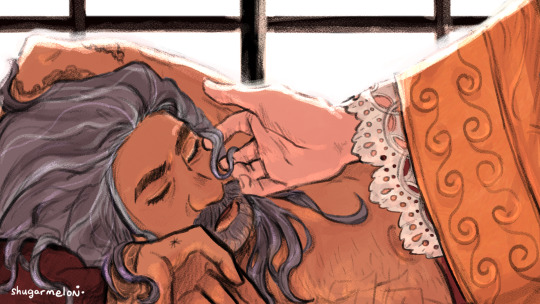
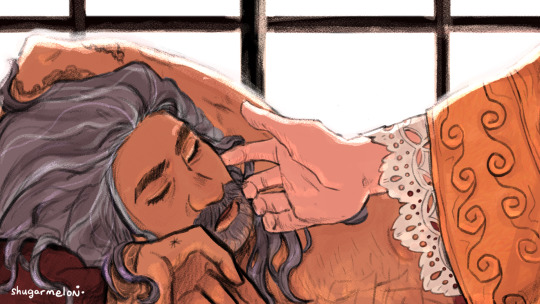
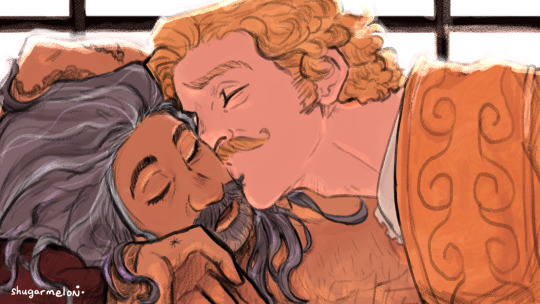
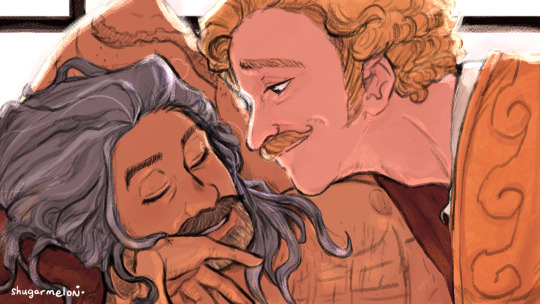
good morning darling, i love you (he’s up early to prepare their date) [ID: This is a four-panels digital illustration of Edward and Stede from Our Flag Means Death. The scene takes place during a bright early morning, some time after they have reunited and made up. In this, Edward is asleep on their bed, sporting a short beard and shirtless, body turned towards the viewer. In the first 2 panels, only Stede’s hand is in the frame, gently brushing away a stray lock of hair from Ed’s face and caressing his cheek. In the third panel, Stede appears in the frame, dressed in his nightgown, yellow robe, and sporting a moustache. He leans over to kiss Ed on the cheek. Ed doesn’t wake, instead in the fourth panel he smiles dreamily in his sleep. Stede watches him with his own smile, completely besotted. /. End ID]
7K notes
·
View notes
Text
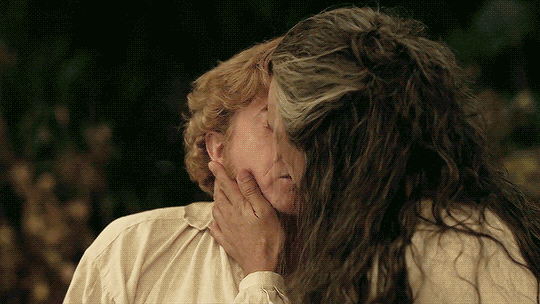
No because, the way Stede keeps his eyes blissfully closed well after the kiss ends, and the way he looks so fondly at Ed when his eyes finally open, and the way you can see Ed’s cheeks tilt upwards with the start of his own smile, and the way Ed keeps his hand gently on Stede’s face, and the way they stay so impossibly close together, and the way Ed’s nose brushes against Stede’s because they’re so close together, and—
2K notes
·
View notes
Text


he’s so baby girl
5 notes
·
View notes
